2012中考一轮复习精品课件(含2011中考真题)英语外研版八下Modules1-5(69张ppt)
文档属性
| 名称 | 2012中考一轮复习精品课件(含2011中考真题)英语外研版八下Modules1-5(69张ppt) |
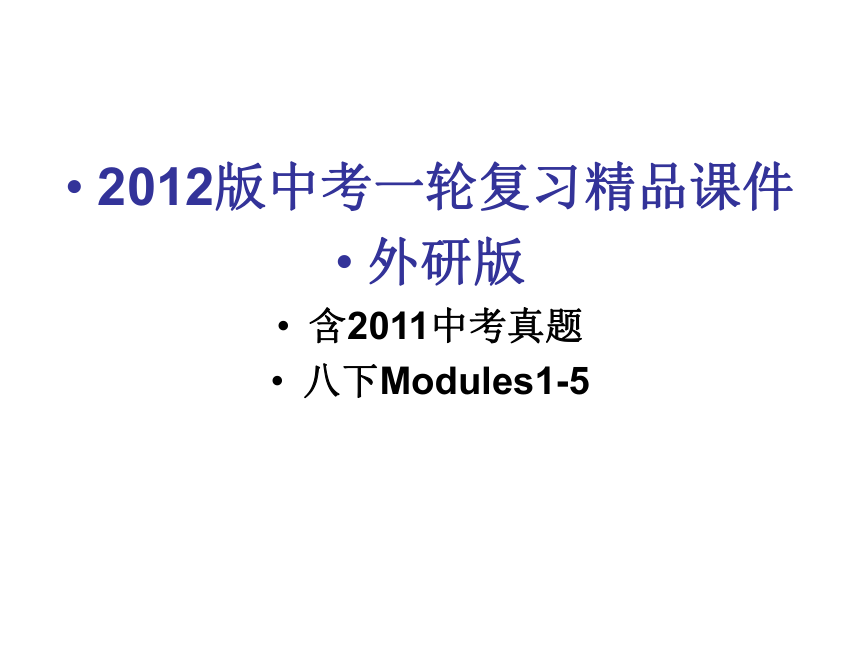
|
|
| 格式 | rar | ||
| 文件大小 | 581.7KB | ||
| 资源类型 | 教案 | ||
| 版本资源 | 通用版 | ||
| 科目 | 英语 | ||
| 更新时间 | 2012-01-16 00:00:00 | ||
图片预览

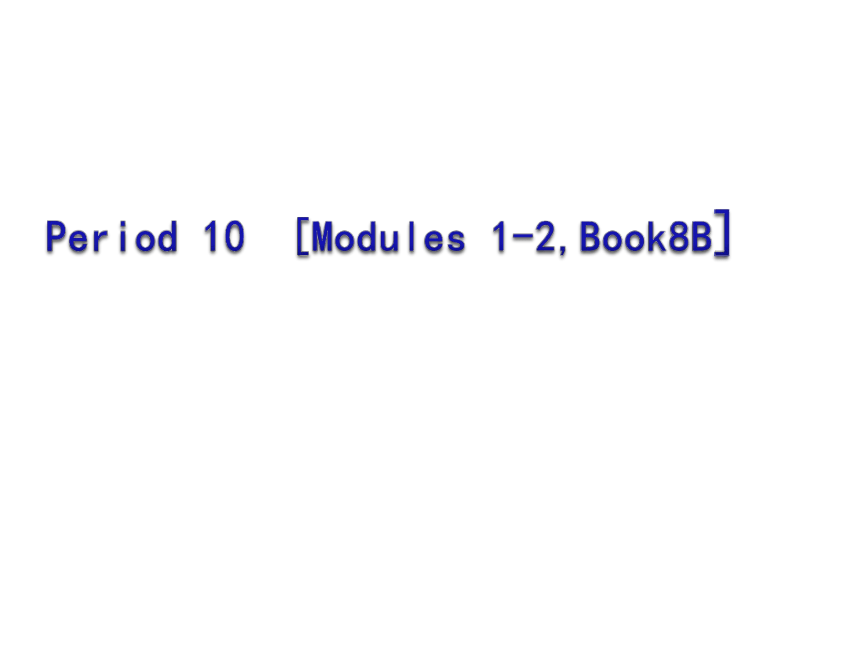
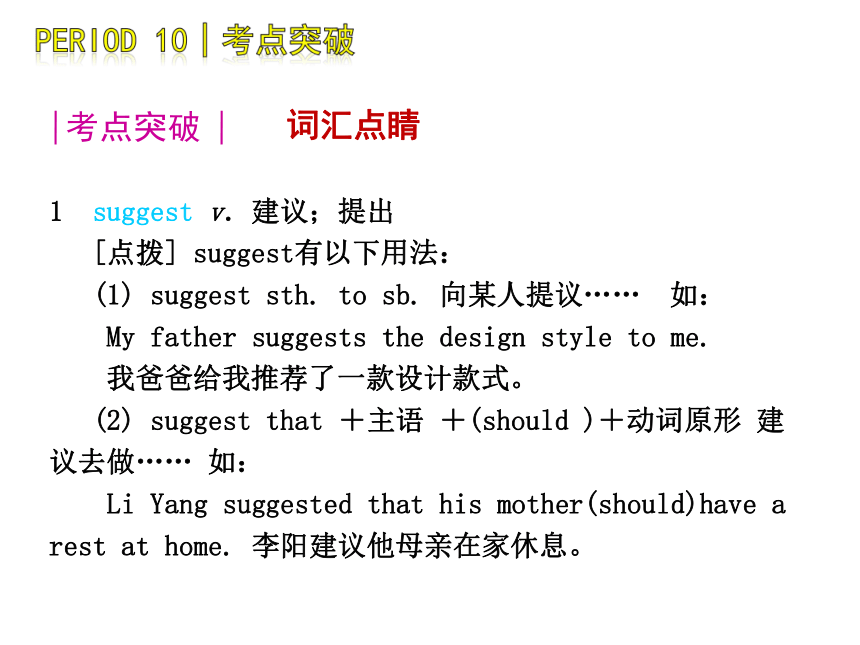
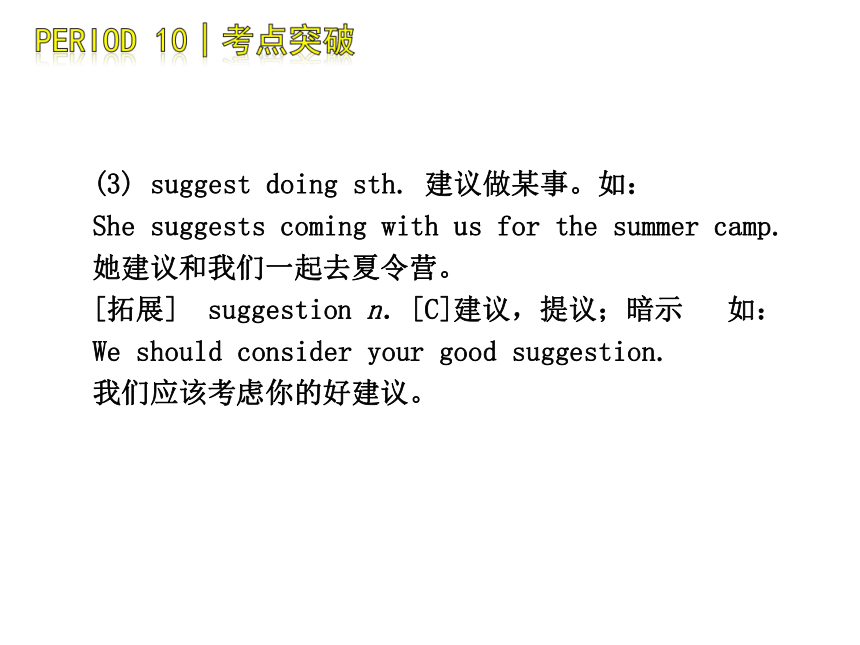
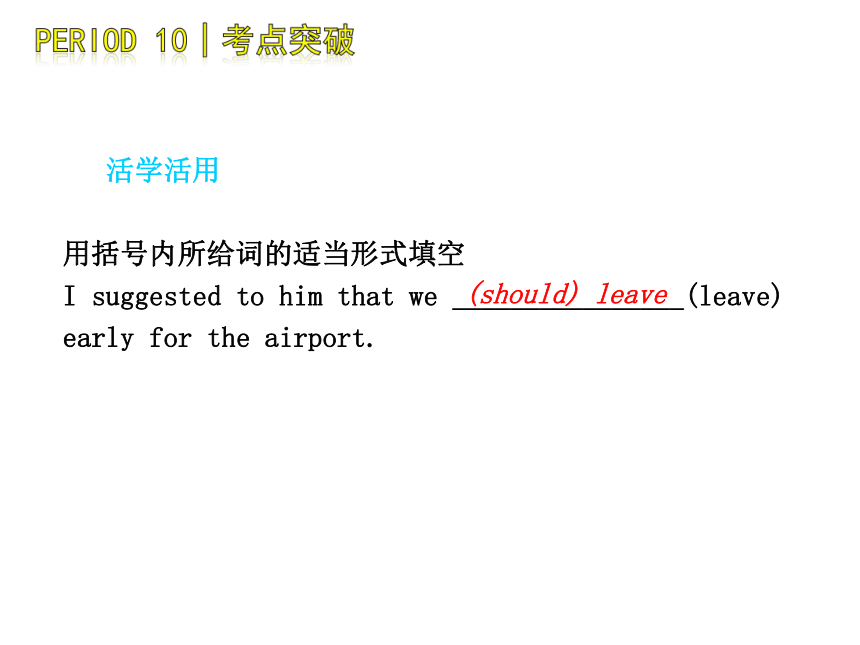
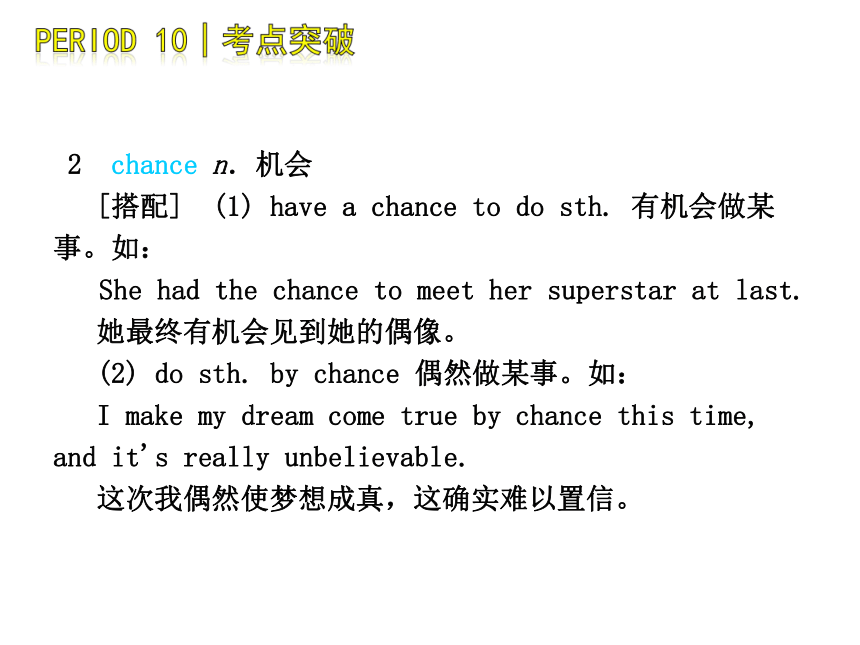
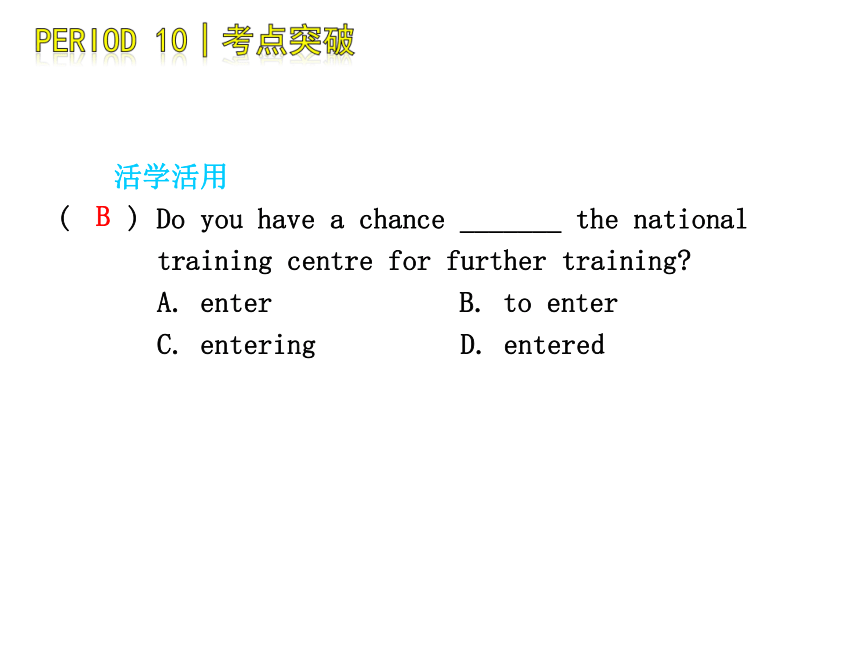
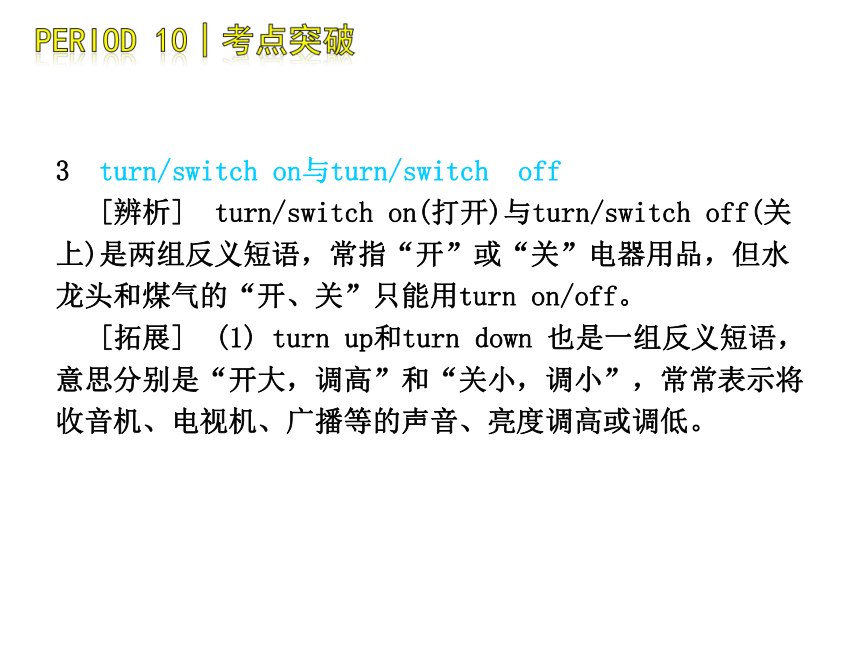
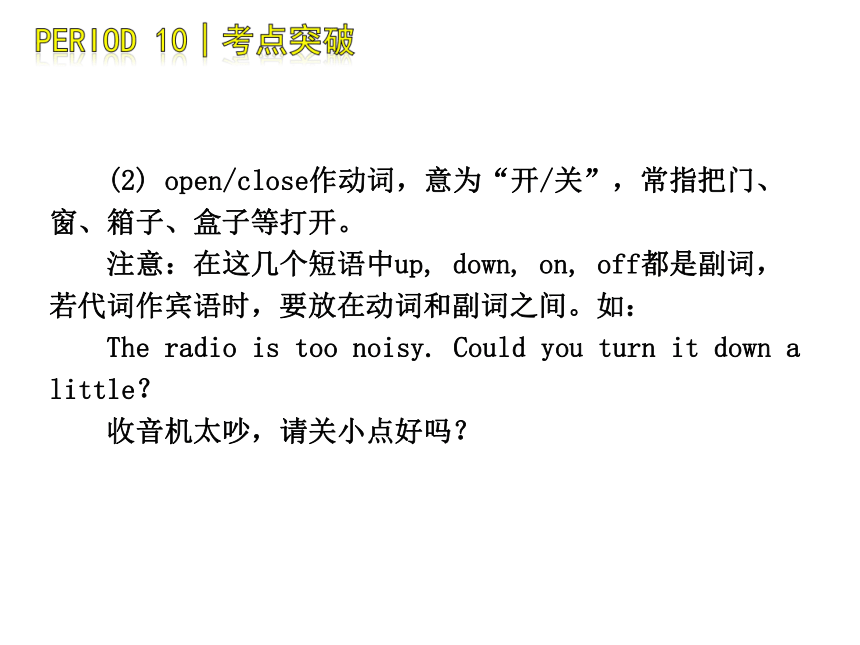
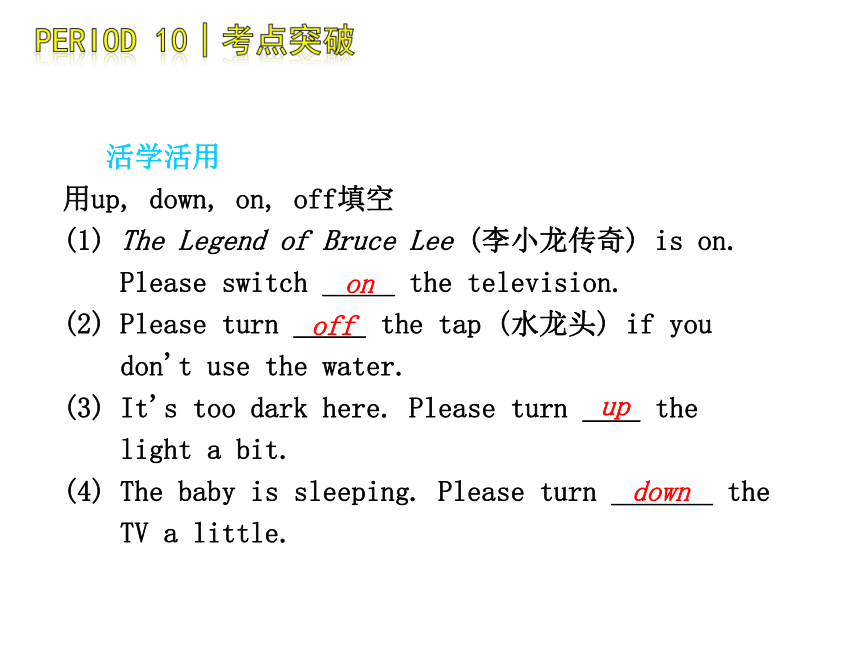
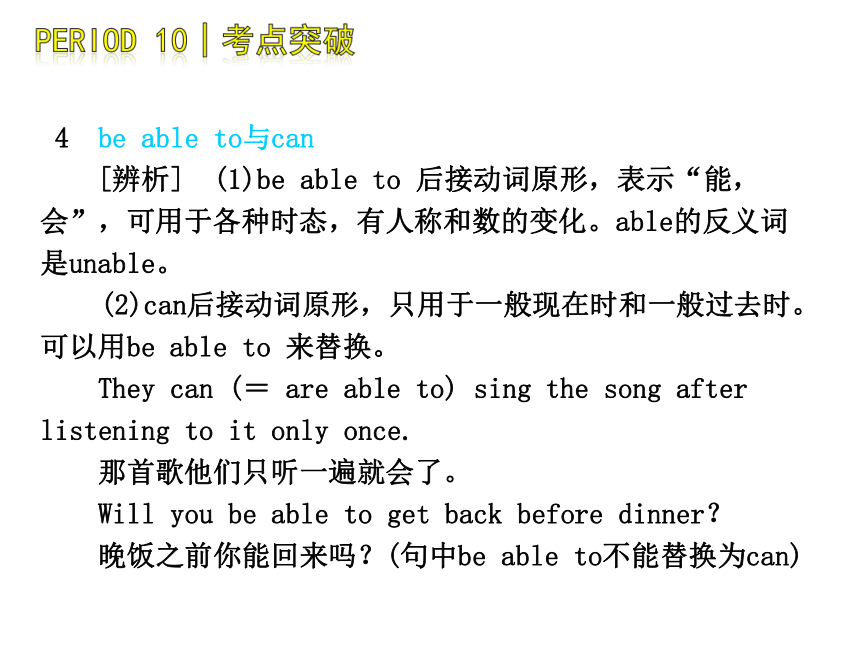
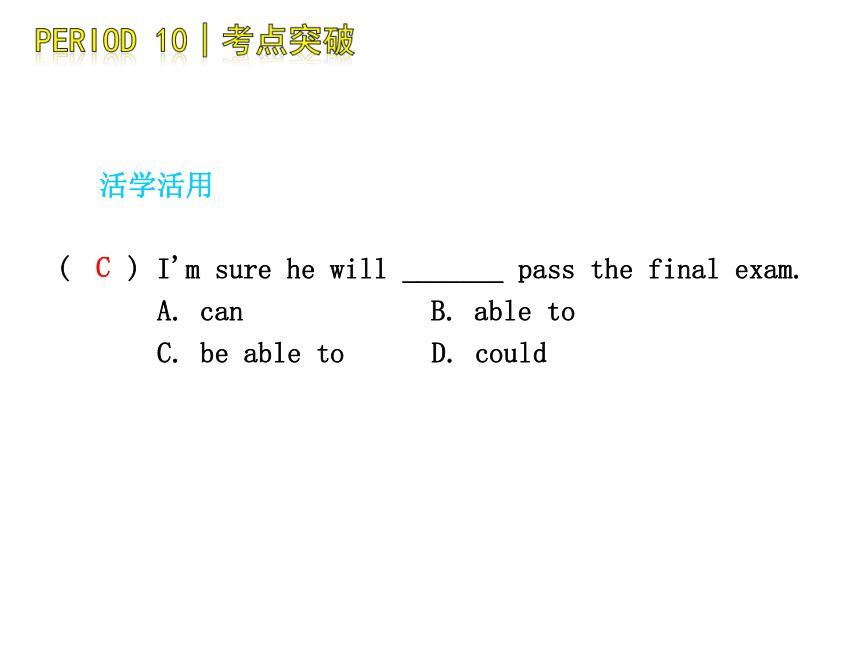
文档简介
(共69张PPT)
2012版中考一轮复习精品课件
外研版
含2011中考真题
八下Modules1-5
·外研版(衔接)
·外研版(衔接)
词汇点睛
考点突破
1 suggest v.建议;提出
[点拨] suggest有以下用法:
(1) suggest sth. to sb. 向某人提议…… 如:
My father suggests the design style to me.
我爸爸给我推荐了一款设计款式。
(2) suggest that +主语 +(should )+动词原形 建议去做…… 如:
Li Yang suggested that his mother(should)have a rest at home. 李阳建议他母亲在家休息。
·外研版(衔接)
(3) suggest doing sth. 建议做某事。如:
She suggests coming with us for the summer camp.
她建议和我们一起去夏令营。
[拓展] suggestion n.[C]建议,提议;暗示 如:
We should consider your good suggestion.
我们应该考虑你的好建议。
·外研版(衔接)
活学活用
用括号内所给词的适当形式填空
I suggested to him that we ________________(leave) early for the airport.
(should) leave
·外研版(衔接)
2 chance n.机会
[搭配] (1) have a chance to do sth. 有机会做某事。如:
She had the chance to meet her superstar at last.
她最终有机会见到她的偶像。
(2) do sth. by chance 偶然做某事。如:
I make my dream come true by chance this time, and it's really unbelievable.
这次我偶然使梦想成真,这确实难以置信。
·外研版(衔接)
活学活用
( ) Do you have a chance _______ the national
training centre for further training
A. enter B. to enter
C. entering D. entered
B
·外研版(衔接)
3 turn/switch on与turn/switch off
[辨析] turn/switch on(打开)与turn/switch off(关上)是两组反义短语,常指“开”或“关”电器用品,但水龙头和煤气的“开、关”只能用turn on/off。
[拓展] (1) turn up和turn down 也是一组反义短语,意思分别是“开大,调高”和“关小,调小”,常常表示将收音机、电视机、广播等的声音、亮度调高或调低。
·外研版(衔接)
(2) open/close作动词,意为“开/关”,常指把门、窗、箱子、盒子等打开。
注意:在这几个短语中up, down, on, off都是副词,若代词作宾语时,要放在动词和副词之间。如:
The radio is too noisy. Could you turn it down a little?
收音机太吵,请关小点好吗?
·外研版(衔接)
活学活用
用up, down, on, off填空
(1) The Legend of Bruce Lee (李小龙传奇) is on.
Please switch _____ the television.
(2) Please turn _____ the tap (水龙头) if you
don't use the water.
(3) It's too dark here. Please turn ____ the
light a bit.
(4) The baby is sleeping. Please turn _______ the
TV a little.
on
off
up
down
·外研版(衔接)
4 be able to与can
[辨析] (1)be able to 后接动词原形,表示“能,会”,可用于各种时态,有人称和数的变化。able的反义词是unable。
(2)can后接动词原形,只用于一般现在时和一般过去时。可以用be able to 来替换。
They can (= are able to) sing the song after listening to it only once.
那首歌他们只听一遍就会了。
Will you be able to get back before dinner?
晚饭之前你能回来吗?(句中be able to不能替换为can)
·外研版(衔接)
活学活用
( ) I'm sure he will _______ pass the final exam.
A. can B. able to
C. be able to D. could
C
·外研版(衔接)
5 such与so
[辨析] (1)such 是形容词,意为“如此,这样”,修饰名词或名词词组,so是副词,只能修饰形容词或副词,so 还可与表示数量的形容词many, few, much, little连用,形成固定搭配。如:
·外研版(衔接)
(2) 请同学们识记下列搭配:
so + adj. + a(n) + n. (单数)
= such + a(n) + adj.+ n. (单数)
such +adj.+n. (pl.)
so many(如此多的)
so few(如此少的)
so much(如此多的)
so little(如此少的)
可以加可数名词复数
可以加不可数名词
·外研版(衔接)
活学活用
( ) Thank you so much for bringing me
________ news.
A. such good B. such a good
C. so good D. so good a
A
·外研版(衔接)
句型透视
Her parents have warned her about her schoolwork.
她的父母提醒过她要注意功课。
[点拨] (1) warn sb. about/of sth. 表示“提醒某人注意某事”。如:They warned us of possible danger.
他们提醒我们注意可能会有的危险。
(2) warn sb. (not) to do sth.=warn sb. against doing sth. 表示“警告某人(不要)做某事”。如:
The policeman warned the teenagers not to play computer games too much. 那名警察警告那些青少年不要在电脑游戏上花太多时间。
·外研版(衔接)
活学活用
用括号内所给词的适当形式填空
My teacher always warns us _______________
(not cross)the street at the rush hours.
(2) They warned the little kid of ____________
(hurt)by the wild tiger here at night.
not to cross
being hurt
·外研版(衔接)
2 Rather you than me! 你行,我可不行!
[点拨] 句中rather常见的用法有:
(1) rather意为“相当、十分”时,常修饰形容词、副词的原级、比较级。
(2) rather与than连用,意为“而不”,表否定,常连接两个成分、词性相同的词或短语。
(3) would 与rather连用(would rather= 'd rather),表示“宁愿、宁可、较喜欢”,后接动词原形。
·外研版(衔接)
活学活用
(1) 赵老师打了电话而不是写信。
Miss Zhao telephoned ________ ______ wrote
a letter.
(2) 在这样一个雨天,我更愿意待在家里,而不愿出去。
______ ________ ______ at home than go
out on such a rainy day.
rather
than
I'd
rather
stay
·外研版(衔接)
If you tell him the truth,he'll be angry with you,but at least you'll prove how honest you are.
你要是告诉他实情,他会生你的气,但至少你会证明自己是多么诚实。
[点拨] (1)be angry with sb. 对某人生气
be angry at/about sth. 因某事而生气
be angry to do sth. 因……而生气。如:
My teacher was angry with Lucy because she broke the window.
因为露西打破了玻璃,所以老师很生她的气。
·外研版(衔接)
Mom was angry at what she said.
妈妈因她说的话而生气。
I was angry to hear that.
听到那件事我很生气。
(2)at least 表示“至少”,其反义词组是at most,表示“至多”。
·外研版(衔接)
活学活用
1. 单项填空
( ) Don't be angry ________ your little brother.
He is only 4.
A. to B. in C. with D. about
2. 根据汉语意思完成句子
It takes me __________(至少) 30 minutes to get to
my factory.
C
at least
·外研版(衔接)
高频考点
( ) 1. [2011·潍坊] If Tom ________ the game,
we'll give him a surprise.
A. win B. wins
C. won D. winning
B
考查if引导的条件状语从句, 如果主句和从句发生的动作都在将来时间, 从句用一般现在时代替将来时。
·外研版(衔接)
( ) 2. Bob promises to join in the football
match ________ he has to help his parents
on the farm.
A. if B. as
C. unless D. when
C
if如果; unless除非, 相当于if…not, 根据句意可知选C。
·外研版(衔接)
( ) 3. ________ spending our vacation in a
hotel,why not try hiking in the country
A. Instead of B. Because of
C. Thanks to D. As for
A
本题考查短语的用法。由下句“为什么不到农村去远足呢?”可知说话者想用 “远足”代替“在一个旅馆里度假”。 instead of “而是; 代替”, because of “由于”, thanks to “幸亏; 由于”,as for “至于”。
·外研版(衔接)
( ) 4. Mum often warns us ________ football
on the street.
A. to play B. not to play
C. plays D. playing
B
warn sb. to do sth. 提醒某人做某事; warn sb. not to do sth. 提醒某人不要做某事。由句意“妈妈经常提醒我们不要在街上踢足球”可知, 应选B。
基础过关
词汇专练
Ⅰ.根据句意及首字母或汉语提示完成单词
1.We must put on a s________ on the letter before we
send it.
2.This letter is p________ and I don't want anyone else to
read it.
3.W________ we help him or not, he will fail.
4.He's going to have an i________ with Chairman Hu
Jintao.
5.Long ago, people b________ that the world was flat.
·外研版(衔接)
tamp
ersonal
hether
nterview
elieved
6.China is a d___________ country, but America is a
d________ country.
7.What a b________, sunny day it is today!
8.I live alone, but I didn't feel l________.
9.In the modern society, teachers should teach students
how to improve their ________(技能).
10.We don't permit spitting in ________(公众的)places.
·外研版(衔接)
eveloping
eveloped
right
onely
skills
public
Ⅱ.用所给词的适当形式填空
1.Smiling can make people ________(feel) happy,
lively and warm.
2.We invited some foreign friends ________(visit)
Beijing.
3.He asked me if I ________(can) help him.
4.Everyone thought that it was a ___________(success)
show.
5.I remembered ________(turn)off the light, but it's
still on.
·外研版(衔接)
feel
to visit
could
successful
turning
句型专练
Ⅰ.根据汉语意思完成下列句子,每空一词
1.你认为哪种爱好占用的空间最少?
Which hobby do you think ________ ________ the
________ ________.
2.你能告诉我你来自哪里吗?
Can you tell me ________ you___________ ________?
3.是什么使你对音乐这么感兴趣?
What _______you ___________ ____ music
·外研版(衔接)
take
up
least
space
where
come/are
from
made
interested
in
4.你感觉世界是怎样的,它就是怎样的。
The world is ________ you ________ ______ _______.
5.没关系,因为所有昏暗的日子已经过去。
It ________ ________ ________ all the ______days
________ ________.
6.天气一天天暖和起来。
It's getting warmer ________ ________ ________.
7.简擅长唱歌也擅长跳舞。
Jane is good at singing ________ ________
________dancing.
·外研版(衔接)
what
think
it
is
doesn't
matter
because
dark
have
gone
day
by
day
as
well
as
8.他们几个星期之后就回来。
They will be back in _____ _______ _______weeks.
9.自从他来这儿之后,已经交了几个朋友。
He ________ ________a few friends ________he came
here.
10.在美国上学感觉如何?
What does it ________ ________ to be at school in
America
·外研版(衔接)
a
couple
of
has
made
since
feel
like
Ⅱ.句型转换
1.He was so tired that he couldn‘t move farther.(合
为一句)
He was________tired________move farther.
2.When I was 13 years old, a boy gave me a
beautiful smile.(改为同义句)
________the ________ ________13, a boy gave a
beautiful smile ____ _____.
3.Could you tell me What time will the plane
leave (合为一句)
Could you tell me what time the plane ______
________?
·外研版(衔接)
too
to
At
age
of
to
me
will
leave
4.When does the train arrive?I want to know.
(合为一句)
I want to know ________the train ________.
5.What time is it Could you tell me (合为一句)
Could you tell me ________ ________ ______
________?
·外研版(衔接)
when
arrives
what
time
it
is
每日一辨
as well as与as well
(1)as well as 意为“也”,“不仅……而且”意同:not only… but also具有连词性。如:
She is my friend as well as my doctor.
她不仅是我的医生,也是我的朋友。
(2)as well 作“也”讲时具有副词性。大致相当于also 或 too。如:He can speak Chinese as well.他也能讲汉语。
·外研版(衔接)
·外研版(衔接)
·外研版(衔接)
词汇点睛
考点突破
1 advise v.建议;劝告
[搭配] advise 的常用结构:
advise (doing)sth. 建议(做)某事
advise sb.(not) to do sth. 建议某人(不要)做某事
advise sb. against doing sth. 劝告某人(不要)做某事
advise sb. on sth. 在某方面给某人劝告
advise + that/wh 从句 建议……
注意:advise的名词形式是advice,“劝告,建议”,为不可数名词。
·外研版(衔接)
活学活用
尽管医生建议汤姆在家休息一周,但是他仍然上班。
Although the doctor __________ _____ ____ ______ at home for a week,he still went on working.
advised
Tom
to
rest
·外研版(衔接)
2 fight v.& n.打斗;搏斗
[搭配] fight with sb.与……并肩战斗;与……作战
fight against sb./sth.反对……而斗争
fight for sth.争取获得某物
fight for freedom 争取获得自由
如:In World War Two, Britain fought against Germany with France.
在二战中,英国与法国联合抗击德国。
Have you fought with your brother again
你又和弟弟打架了吗?
·外研版(衔接)
活学活用
( ) Much has been done to ______ pollution.
A. fight for B. fight against
C. fight on D. fight
B
·外研版(衔接)
3 become, get, turn与grow
[辨析] 这四个词都可意为“变化”,但也有区别。
(1) become比较正式,一般指身份、职位的变化。become作瞬间动词时指状态的变化,后面接名词或形容词作表语。
(2) get较口语化,后常接形容词。
(3) turn是指在颜色和性质等方面变得与原来不同,其后接名词或形容词作表语。
·外研版(衔接)
(4) grow表示“变化”,指变化的过程,“渐渐地变为”。如:
The travelers became/got thirsty. 旅客们渴了。
My father is getting thinner and thinner now.
我爸爸现在越来越瘦。
Please don't get angry.
请不要生气。
·外研版(衔接)
活学活用
(1) 春天,所有的树都变绿了。
In spring, all trees _______ ________.
(2) 他渐渐老了。
He is __________ ______.
turn
green
growing
old
·外研版(衔接)
4 except, besides与except for
[辨析] (1)except意为“除了……之外”,后跟名词或代词作宾语,强调从整体中除去的部分,即except后的部分不包括在整体之内。如:
We all went to the zoo except our teacher.
除了老师,我们都去动物园了。(老师没去)
(2)besides意为“除了……之外(还)”,它相当于as well as, 即“除了一部分还有另外一部分”,表示besides后面的部分包括在整体之内。如:
We all went to the zoo besides our teacher.
包括老师在内,我们都去动物园了。(老师也去了)
·外研版(衔接)
(3)except for意为“除……之外”,用在说明整体情况后,对细节加以纠正,即“一部分被肯定,另一部分被否定”。如:
Your homework is good except for some mistakes in spelling.
除了在单词拼写上有点错误外,你的作业很好。
·外研版(衔接)
活学活用
( ) (1)Where's Lily We are all here ______ her.
A. besides B. about
C. with D. except
( ) (2) I know nothing about the young lady
________ she is from Beijing.
A. except B. except for
C. except that D. besides
D
C
·外研版(衔接)
句型透视
From the top we hoped for a wonderful view of the
lakes and forests, but we could only see the mountain tops through the clouds.
我们原本希望从山顶看到湖泊和森林的美丽景色,可结
果我们只透过云彩看到了山顶。
[点拨] 该句中hope for 是一个动词短语,其后面需接名词或代词作宾语,表示“希望得到”的意思。如:
How I hoped for his success!
我是多么希望他成功啊!
·外研版(衔接)
[拓展] 当hope作及物动词时,不可直接接名词作宾语,但其后可接that从句或动词不定式作宾语。有时可用替代词so作宾语,代替从句或不定式所叙述的内容。如:
—Do you think he will come tomorrow
—I hope so.
“你认为他明天回来吗?”
“但愿如此”。
·外研版(衔接)
活学活用
( ) [2010·南京] —Are you confident about this
evening's performance, Katie
—________.I'm well prepared and feel I've
got everything ready.
A. I hope so B. It's hard to say
C. Sure,I am D. I am afraid not
C
·外研版(衔接)
She explained that her visit was about making
friends.
她解释说,她此行的目的是为了交朋友。
[点拨] (1) be about doing sth. 目的是……,为了……
(2)be about to do sth. 即将,正要做某事(在时间上指最近的将来)
I was just about to ask you the same thing.
我刚才正要问你同一件事。
(3)How about doing sth. (建议时说) ……怎么样?
·外研版(衔接)
活学活用
(1) 他来是为了取回他的自行车。
His coming is ________ __________ his bike back.
(2) 新学年开学在即。
The new school year is ________ _____ begin.
about
getting
about
to
·外研版(衔接)
There's plenty of food and drink, so no one is hungry. 有许多食品和饮料,所以没有人感到饥饿。
[点拨] 句中plenty of 意为“许多,大量的”,只用于陈述句中;在疑问句中常用enough;在否定句中常用many 或much。
[拓展] 表示“许多”的短语用法归类如下:
(1)只能修饰不可数名词的有: much, a great deal of。
(2)只能修饰可数名词的有: many, a number of, numbers of。
(3)既可修饰可数名词,又可修饰不可数名词的有: plenty of, lots of, a lot of。
·外研版(衔接)
活学活用
[2010·烟台] 体育迷们有很多机会去观看激动人心的比赛。
Sports fans have ______________ ____ chances ____ _______ exciting competitions.
plenty/lots
of
to
watch
·外研版(衔接)
高频考点
( ) 1. —Linda, pass my glasses to me, please.
I can ________ read the words in the
newspaper.
—With pleasure.
A. hardly B. almost
C. nearly D. clearly
A
由句意: 琳达, 把眼镜递给我。可推知下一句是: 我几乎看不见报纸上的字。 almost, nearly 意为“几乎”; clearly意为“清楚地”。只有hardly符合题意。
·外研版(衔接)
( ) 2. We visited the Great Wall yesterday. We
sang almost ________.
A. the whole way B. whole the way
C. the all way D. all a way
A
whole 与all的意思通常是一样的, 只是语序不一样。all用于冠词、所有格和其他限定词之前, whole则用于冠词等之后。如: all the time=the whole time。
·外研版(衔接)
( ) 3. [2011·临沂] The policeman asked the
small girl _______.
A. why she was crying
B. why was she crying
C. why she is crying
D. why is she crying
A
宾语从句要用陈述语序, 排除B和D, 动词为过去时态时, 宾语从句中也要用过去时态的相应时态。由句意“警察问这个女孩哭的原因”可知当时女孩正在哭,用过去进行时。
·外研版(衔接)
( ) 4. —The little girl ________ her seat to
an old man on the bus.
—What a kind girl!
A. brought B. offered
C. gave D. lent
B
brought是“带来”的意思; offered是“提供” 的意思; gave 是“把某物给某人”; lent是“借给某人”。由情景可知, “小女孩把她的座位给了老人”。
·外研版(衔接)
( ) 5. [2011·山西] The tour guide has made
the route for the school trip. We don't
need to _______that.
A. be worried about
B. be afraid of
C. be sorry for
A
固定短语的考查。be worried about 意为“担心, 忧虑”, be afraid of 意为“害怕”, be sorry for 意为“抱歉”。 根据句意“导游已经制定了旅游路线。我们不需要担心”, 可知选A。
基础过关
词汇专练
Ⅰ.根据句意及首字母或汉语提示完成单词
1.By the time I got to school, I r________that I had left my
bag at home.
2.You have to e________why you are late again.
3.The teacher will c________whether the students have
finished their homework.
4.She sings well and she has a sweet v________.
·外研版(衔接)
ealised
xplain
heck
oice
5.There are sixty s________ in one minute.
6.You must do your homework by yourself. Don't
c____ others'.
7.He looked down and saw a man s__________ money
from a girl.
8.—What are you p________ for
—For our English exam.
·外研版(衔接)
econds
opy
teal/tealing
reparing
9.A dog rushed out suddenly and ________(咬)him.
10.What he said can't ________(证明)he is honest.
11.Their team played better than ours, and at last they
________(打败)us.
12.The doctor says, “take the _________(药物) three times
a day.”
·外研版(衔接)
bit
prove
beat
medicine
Ⅱ.用所给词的适当形式填空
1.On CCTV-9 everyone needs ___________(speak)
English well.
2.He is __________(honest).He never tells us the truth.
3.There are some ________(shelf) in the room.
4.He ran ________(angry) out of the room.
·外研版(衔接)
to speak
dishonest
shelves
angrily
5.If I refuse him ________(copy) my homework, he will be
unhappy.
6.Z is the ________(finally) letter in the alphabet.
7.My best friend Linda loves __________(swim) and art.
8.I couldn't describe my ________(feel) when I saw her
again.
·外研版(衔接)
to copy
final
swimming
feeling
句型专练
Ⅰ.根据汉语意思完成下列句子,每空一词
1.你可以在词典上查到那个新单词。
You can ________ ________ the new word ______
the dictionary.
2.如果明天不下雨的话,请来参加我的聚会。
If it _________ ________ tomorrow, please come to my
party.
3.如果是红灯亮的话,就稍等一会儿。
If the red light ________ ________, wait for a minute.
·外研版(衔接)
look
up
in
doesn't
rain
is/turns
on
4.如果我们想尽快结束工作,就轮流去做。
________ ________ ________ do it if we want to finish
the work as soon as possible.
5.如果想看世界杯,就打开电视吧。
________ ________ the TV_______ you want to watch
the World Cup.
6.关闭电脑之前别忘了保存你的文件。
Don't ________ ________ _______ your documents
before turning off the computer.
·外研版(衔接)
Take
turns
to
Turn
on
if
forget
to
save
7.快点,否则你上学要迟到了。
Come on!________ you'll ________late
________school.
8.如果你不知道如何使用这部手机,别着急。
If you don't know ______ ____use the mobile
phone, ________ ________.
·外研版(衔接)
Or
be
for
how
to
don't
worry
Ⅱ.句型转换
1.They stopped.They had a look.(合并为一句)
They ________ ________ ________a look.
2.It seems to rain tomorrow.(改为同义句)
______ ________ ________it's going to rain
tomorrow.
3.The more you eat, the fatter you will be.(改为同义句)
________ you eat ________,you will be fatter.
·外研版(衔接)
stopped
to
have
It
seems
that
If
more
4.She isn't old enough to go to school.(同义句)
She is ________ ________ to go to school.
5.We didn‘t know what we should do next. (改为同
义句)
We didn't know ______ _____ _____ next.
·外研版(衔接)
too
young
what
to
do
每日一辨
alone与lonely
(1)alone adj. 意为“单独的”,只能作表语;此外alone 还可作副词,相当于by oneself,意为“单独地”“独自”。如:
I'll go there alone.= I'll go there by myself.我将独自去那儿。
(2)lonely adj.意为“孤独的”、“寂寞的”,含有较浓的情感色彩。lonely既可作定语也可作表语。如:
I didn't feel lonely though I was alone.我虽孤身一人,但并不感到寂寞。
·外研版(衔接)
2012版中考一轮复习精品课件
外研版
含2011中考真题
八下Modules1-5
·外研版(衔接)
·外研版(衔接)
词汇点睛
考点突破
1 suggest v.建议;提出
[点拨] suggest有以下用法:
(1) suggest sth. to sb. 向某人提议…… 如:
My father suggests the design style to me.
我爸爸给我推荐了一款设计款式。
(2) suggest that +主语 +(should )+动词原形 建议去做…… 如:
Li Yang suggested that his mother(should)have a rest at home. 李阳建议他母亲在家休息。
·外研版(衔接)
(3) suggest doing sth. 建议做某事。如:
She suggests coming with us for the summer camp.
她建议和我们一起去夏令营。
[拓展] suggestion n.[C]建议,提议;暗示 如:
We should consider your good suggestion.
我们应该考虑你的好建议。
·外研版(衔接)
活学活用
用括号内所给词的适当形式填空
I suggested to him that we ________________(leave) early for the airport.
(should) leave
·外研版(衔接)
2 chance n.机会
[搭配] (1) have a chance to do sth. 有机会做某事。如:
She had the chance to meet her superstar at last.
她最终有机会见到她的偶像。
(2) do sth. by chance 偶然做某事。如:
I make my dream come true by chance this time, and it's really unbelievable.
这次我偶然使梦想成真,这确实难以置信。
·外研版(衔接)
活学活用
( ) Do you have a chance _______ the national
training centre for further training
A. enter B. to enter
C. entering D. entered
B
·外研版(衔接)
3 turn/switch on与turn/switch off
[辨析] turn/switch on(打开)与turn/switch off(关上)是两组反义短语,常指“开”或“关”电器用品,但水龙头和煤气的“开、关”只能用turn on/off。
[拓展] (1) turn up和turn down 也是一组反义短语,意思分别是“开大,调高”和“关小,调小”,常常表示将收音机、电视机、广播等的声音、亮度调高或调低。
·外研版(衔接)
(2) open/close作动词,意为“开/关”,常指把门、窗、箱子、盒子等打开。
注意:在这几个短语中up, down, on, off都是副词,若代词作宾语时,要放在动词和副词之间。如:
The radio is too noisy. Could you turn it down a little?
收音机太吵,请关小点好吗?
·外研版(衔接)
活学活用
用up, down, on, off填空
(1) The Legend of Bruce Lee (李小龙传奇) is on.
Please switch _____ the television.
(2) Please turn _____ the tap (水龙头) if you
don't use the water.
(3) It's too dark here. Please turn ____ the
light a bit.
(4) The baby is sleeping. Please turn _______ the
TV a little.
on
off
up
down
·外研版(衔接)
4 be able to与can
[辨析] (1)be able to 后接动词原形,表示“能,会”,可用于各种时态,有人称和数的变化。able的反义词是unable。
(2)can后接动词原形,只用于一般现在时和一般过去时。可以用be able to 来替换。
They can (= are able to) sing the song after listening to it only once.
那首歌他们只听一遍就会了。
Will you be able to get back before dinner?
晚饭之前你能回来吗?(句中be able to不能替换为can)
·外研版(衔接)
活学活用
( ) I'm sure he will _______ pass the final exam.
A. can B. able to
C. be able to D. could
C
·外研版(衔接)
5 such与so
[辨析] (1)such 是形容词,意为“如此,这样”,修饰名词或名词词组,so是副词,只能修饰形容词或副词,so 还可与表示数量的形容词many, few, much, little连用,形成固定搭配。如:
·外研版(衔接)
(2) 请同学们识记下列搭配:
so + adj. + a(n) + n. (单数)
= such + a(n) + adj.+ n. (单数)
such +adj.+n. (pl.)
so many(如此多的)
so few(如此少的)
so much(如此多的)
so little(如此少的)
可以加可数名词复数
可以加不可数名词
·外研版(衔接)
活学活用
( ) Thank you so much for bringing me
________ news.
A. such good B. such a good
C. so good D. so good a
A
·外研版(衔接)
句型透视
Her parents have warned her about her schoolwork.
她的父母提醒过她要注意功课。
[点拨] (1) warn sb. about/of sth. 表示“提醒某人注意某事”。如:They warned us of possible danger.
他们提醒我们注意可能会有的危险。
(2) warn sb. (not) to do sth.=warn sb. against doing sth. 表示“警告某人(不要)做某事”。如:
The policeman warned the teenagers not to play computer games too much. 那名警察警告那些青少年不要在电脑游戏上花太多时间。
·外研版(衔接)
活学活用
用括号内所给词的适当形式填空
My teacher always warns us _______________
(not cross)the street at the rush hours.
(2) They warned the little kid of ____________
(hurt)by the wild tiger here at night.
not to cross
being hurt
·外研版(衔接)
2 Rather you than me! 你行,我可不行!
[点拨] 句中rather常见的用法有:
(1) rather意为“相当、十分”时,常修饰形容词、副词的原级、比较级。
(2) rather与than连用,意为“而不”,表否定,常连接两个成分、词性相同的词或短语。
(3) would 与rather连用(would rather= 'd rather),表示“宁愿、宁可、较喜欢”,后接动词原形。
·外研版(衔接)
活学活用
(1) 赵老师打了电话而不是写信。
Miss Zhao telephoned ________ ______ wrote
a letter.
(2) 在这样一个雨天,我更愿意待在家里,而不愿出去。
______ ________ ______ at home than go
out on such a rainy day.
rather
than
I'd
rather
stay
·外研版(衔接)
If you tell him the truth,he'll be angry with you,but at least you'll prove how honest you are.
你要是告诉他实情,他会生你的气,但至少你会证明自己是多么诚实。
[点拨] (1)be angry with sb. 对某人生气
be angry at/about sth. 因某事而生气
be angry to do sth. 因……而生气。如:
My teacher was angry with Lucy because she broke the window.
因为露西打破了玻璃,所以老师很生她的气。
·外研版(衔接)
Mom was angry at what she said.
妈妈因她说的话而生气。
I was angry to hear that.
听到那件事我很生气。
(2)at least 表示“至少”,其反义词组是at most,表示“至多”。
·外研版(衔接)
活学活用
1. 单项填空
( ) Don't be angry ________ your little brother.
He is only 4.
A. to B. in C. with D. about
2. 根据汉语意思完成句子
It takes me __________(至少) 30 minutes to get to
my factory.
C
at least
·外研版(衔接)
高频考点
( ) 1. [2011·潍坊] If Tom ________ the game,
we'll give him a surprise.
A. win B. wins
C. won D. winning
B
考查if引导的条件状语从句, 如果主句和从句发生的动作都在将来时间, 从句用一般现在时代替将来时。
·外研版(衔接)
( ) 2. Bob promises to join in the football
match ________ he has to help his parents
on the farm.
A. if B. as
C. unless D. when
C
if如果; unless除非, 相当于if…not, 根据句意可知选C。
·外研版(衔接)
( ) 3. ________ spending our vacation in a
hotel,why not try hiking in the country
A. Instead of B. Because of
C. Thanks to D. As for
A
本题考查短语的用法。由下句“为什么不到农村去远足呢?”可知说话者想用 “远足”代替“在一个旅馆里度假”。 instead of “而是; 代替”, because of “由于”, thanks to “幸亏; 由于”,as for “至于”。
·外研版(衔接)
( ) 4. Mum often warns us ________ football
on the street.
A. to play B. not to play
C. plays D. playing
B
warn sb. to do sth. 提醒某人做某事; warn sb. not to do sth. 提醒某人不要做某事。由句意“妈妈经常提醒我们不要在街上踢足球”可知, 应选B。
基础过关
词汇专练
Ⅰ.根据句意及首字母或汉语提示完成单词
1.We must put on a s________ on the letter before we
send it.
2.This letter is p________ and I don't want anyone else to
read it.
3.W________ we help him or not, he will fail.
4.He's going to have an i________ with Chairman Hu
Jintao.
5.Long ago, people b________ that the world was flat.
·外研版(衔接)
tamp
ersonal
hether
nterview
elieved
6.China is a d___________ country, but America is a
d________ country.
7.What a b________, sunny day it is today!
8.I live alone, but I didn't feel l________.
9.In the modern society, teachers should teach students
how to improve their ________(技能).
10.We don't permit spitting in ________(公众的)places.
·外研版(衔接)
eveloping
eveloped
right
onely
skills
public
Ⅱ.用所给词的适当形式填空
1.Smiling can make people ________(feel) happy,
lively and warm.
2.We invited some foreign friends ________(visit)
Beijing.
3.He asked me if I ________(can) help him.
4.Everyone thought that it was a ___________(success)
show.
5.I remembered ________(turn)off the light, but it's
still on.
·外研版(衔接)
feel
to visit
could
successful
turning
句型专练
Ⅰ.根据汉语意思完成下列句子,每空一词
1.你认为哪种爱好占用的空间最少?
Which hobby do you think ________ ________ the
________ ________.
2.你能告诉我你来自哪里吗?
Can you tell me ________ you___________ ________?
3.是什么使你对音乐这么感兴趣?
What _______you ___________ ____ music
·外研版(衔接)
take
up
least
space
where
come/are
from
made
interested
in
4.你感觉世界是怎样的,它就是怎样的。
The world is ________ you ________ ______ _______.
5.没关系,因为所有昏暗的日子已经过去。
It ________ ________ ________ all the ______days
________ ________.
6.天气一天天暖和起来。
It's getting warmer ________ ________ ________.
7.简擅长唱歌也擅长跳舞。
Jane is good at singing ________ ________
________dancing.
·外研版(衔接)
what
think
it
is
doesn't
matter
because
dark
have
gone
day
by
day
as
well
as
8.他们几个星期之后就回来。
They will be back in _____ _______ _______weeks.
9.自从他来这儿之后,已经交了几个朋友。
He ________ ________a few friends ________he came
here.
10.在美国上学感觉如何?
What does it ________ ________ to be at school in
America
·外研版(衔接)
a
couple
of
has
made
since
feel
like
Ⅱ.句型转换
1.He was so tired that he couldn‘t move farther.(合
为一句)
He was________tired________move farther.
2.When I was 13 years old, a boy gave me a
beautiful smile.(改为同义句)
________the ________ ________13, a boy gave a
beautiful smile ____ _____.
3.Could you tell me What time will the plane
leave (合为一句)
Could you tell me what time the plane ______
________?
·外研版(衔接)
too
to
At
age
of
to
me
will
leave
4.When does the train arrive?I want to know.
(合为一句)
I want to know ________the train ________.
5.What time is it Could you tell me (合为一句)
Could you tell me ________ ________ ______
________?
·外研版(衔接)
when
arrives
what
time
it
is
每日一辨
as well as与as well
(1)as well as 意为“也”,“不仅……而且”意同:not only… but also具有连词性。如:
She is my friend as well as my doctor.
她不仅是我的医生,也是我的朋友。
(2)as well 作“也”讲时具有副词性。大致相当于also 或 too。如:He can speak Chinese as well.他也能讲汉语。
·外研版(衔接)
·外研版(衔接)
·外研版(衔接)
词汇点睛
考点突破
1 advise v.建议;劝告
[搭配] advise 的常用结构:
advise (doing)sth. 建议(做)某事
advise sb.(not) to do sth. 建议某人(不要)做某事
advise sb. against doing sth. 劝告某人(不要)做某事
advise sb. on sth. 在某方面给某人劝告
advise + that/wh 从句 建议……
注意:advise的名词形式是advice,“劝告,建议”,为不可数名词。
·外研版(衔接)
活学活用
尽管医生建议汤姆在家休息一周,但是他仍然上班。
Although the doctor __________ _____ ____ ______ at home for a week,he still went on working.
advised
Tom
to
rest
·外研版(衔接)
2 fight v.& n.打斗;搏斗
[搭配] fight with sb.与……并肩战斗;与……作战
fight against sb./sth.反对……而斗争
fight for sth.争取获得某物
fight for freedom 争取获得自由
如:In World War Two, Britain fought against Germany with France.
在二战中,英国与法国联合抗击德国。
Have you fought with your brother again
你又和弟弟打架了吗?
·外研版(衔接)
活学活用
( ) Much has been done to ______ pollution.
A. fight for B. fight against
C. fight on D. fight
B
·外研版(衔接)
3 become, get, turn与grow
[辨析] 这四个词都可意为“变化”,但也有区别。
(1) become比较正式,一般指身份、职位的变化。become作瞬间动词时指状态的变化,后面接名词或形容词作表语。
(2) get较口语化,后常接形容词。
(3) turn是指在颜色和性质等方面变得与原来不同,其后接名词或形容词作表语。
·外研版(衔接)
(4) grow表示“变化”,指变化的过程,“渐渐地变为”。如:
The travelers became/got thirsty. 旅客们渴了。
My father is getting thinner and thinner now.
我爸爸现在越来越瘦。
Please don't get angry.
请不要生气。
·外研版(衔接)
活学活用
(1) 春天,所有的树都变绿了。
In spring, all trees _______ ________.
(2) 他渐渐老了。
He is __________ ______.
turn
green
growing
old
·外研版(衔接)
4 except, besides与except for
[辨析] (1)except意为“除了……之外”,后跟名词或代词作宾语,强调从整体中除去的部分,即except后的部分不包括在整体之内。如:
We all went to the zoo except our teacher.
除了老师,我们都去动物园了。(老师没去)
(2)besides意为“除了……之外(还)”,它相当于as well as, 即“除了一部分还有另外一部分”,表示besides后面的部分包括在整体之内。如:
We all went to the zoo besides our teacher.
包括老师在内,我们都去动物园了。(老师也去了)
·外研版(衔接)
(3)except for意为“除……之外”,用在说明整体情况后,对细节加以纠正,即“一部分被肯定,另一部分被否定”。如:
Your homework is good except for some mistakes in spelling.
除了在单词拼写上有点错误外,你的作业很好。
·外研版(衔接)
活学活用
( ) (1)Where's Lily We are all here ______ her.
A. besides B. about
C. with D. except
( ) (2) I know nothing about the young lady
________ she is from Beijing.
A. except B. except for
C. except that D. besides
D
C
·外研版(衔接)
句型透视
From the top we hoped for a wonderful view of the
lakes and forests, but we could only see the mountain tops through the clouds.
我们原本希望从山顶看到湖泊和森林的美丽景色,可结
果我们只透过云彩看到了山顶。
[点拨] 该句中hope for 是一个动词短语,其后面需接名词或代词作宾语,表示“希望得到”的意思。如:
How I hoped for his success!
我是多么希望他成功啊!
·外研版(衔接)
[拓展] 当hope作及物动词时,不可直接接名词作宾语,但其后可接that从句或动词不定式作宾语。有时可用替代词so作宾语,代替从句或不定式所叙述的内容。如:
—Do you think he will come tomorrow
—I hope so.
“你认为他明天回来吗?”
“但愿如此”。
·外研版(衔接)
活学活用
( ) [2010·南京] —Are you confident about this
evening's performance, Katie
—________.I'm well prepared and feel I've
got everything ready.
A. I hope so B. It's hard to say
C. Sure,I am D. I am afraid not
C
·外研版(衔接)
She explained that her visit was about making
friends.
她解释说,她此行的目的是为了交朋友。
[点拨] (1) be about doing sth. 目的是……,为了……
(2)be about to do sth. 即将,正要做某事(在时间上指最近的将来)
I was just about to ask you the same thing.
我刚才正要问你同一件事。
(3)How about doing sth. (建议时说) ……怎么样?
·外研版(衔接)
活学活用
(1) 他来是为了取回他的自行车。
His coming is ________ __________ his bike back.
(2) 新学年开学在即。
The new school year is ________ _____ begin.
about
getting
about
to
·外研版(衔接)
There's plenty of food and drink, so no one is hungry. 有许多食品和饮料,所以没有人感到饥饿。
[点拨] 句中plenty of 意为“许多,大量的”,只用于陈述句中;在疑问句中常用enough;在否定句中常用many 或much。
[拓展] 表示“许多”的短语用法归类如下:
(1)只能修饰不可数名词的有: much, a great deal of。
(2)只能修饰可数名词的有: many, a number of, numbers of。
(3)既可修饰可数名词,又可修饰不可数名词的有: plenty of, lots of, a lot of。
·外研版(衔接)
活学活用
[2010·烟台] 体育迷们有很多机会去观看激动人心的比赛。
Sports fans have ______________ ____ chances ____ _______ exciting competitions.
plenty/lots
of
to
watch
·外研版(衔接)
高频考点
( ) 1. —Linda, pass my glasses to me, please.
I can ________ read the words in the
newspaper.
—With pleasure.
A. hardly B. almost
C. nearly D. clearly
A
由句意: 琳达, 把眼镜递给我。可推知下一句是: 我几乎看不见报纸上的字。 almost, nearly 意为“几乎”; clearly意为“清楚地”。只有hardly符合题意。
·外研版(衔接)
( ) 2. We visited the Great Wall yesterday. We
sang almost ________.
A. the whole way B. whole the way
C. the all way D. all a way
A
whole 与all的意思通常是一样的, 只是语序不一样。all用于冠词、所有格和其他限定词之前, whole则用于冠词等之后。如: all the time=the whole time。
·外研版(衔接)
( ) 3. [2011·临沂] The policeman asked the
small girl _______.
A. why she was crying
B. why was she crying
C. why she is crying
D. why is she crying
A
宾语从句要用陈述语序, 排除B和D, 动词为过去时态时, 宾语从句中也要用过去时态的相应时态。由句意“警察问这个女孩哭的原因”可知当时女孩正在哭,用过去进行时。
·外研版(衔接)
( ) 4. —The little girl ________ her seat to
an old man on the bus.
—What a kind girl!
A. brought B. offered
C. gave D. lent
B
brought是“带来”的意思; offered是“提供” 的意思; gave 是“把某物给某人”; lent是“借给某人”。由情景可知, “小女孩把她的座位给了老人”。
·外研版(衔接)
( ) 5. [2011·山西] The tour guide has made
the route for the school trip. We don't
need to _______that.
A. be worried about
B. be afraid of
C. be sorry for
A
固定短语的考查。be worried about 意为“担心, 忧虑”, be afraid of 意为“害怕”, be sorry for 意为“抱歉”。 根据句意“导游已经制定了旅游路线。我们不需要担心”, 可知选A。
基础过关
词汇专练
Ⅰ.根据句意及首字母或汉语提示完成单词
1.By the time I got to school, I r________that I had left my
bag at home.
2.You have to e________why you are late again.
3.The teacher will c________whether the students have
finished their homework.
4.She sings well and she has a sweet v________.
·外研版(衔接)
ealised
xplain
heck
oice
5.There are sixty s________ in one minute.
6.You must do your homework by yourself. Don't
c____ others'.
7.He looked down and saw a man s__________ money
from a girl.
8.—What are you p________ for
—For our English exam.
·外研版(衔接)
econds
opy
teal/tealing
reparing
9.A dog rushed out suddenly and ________(咬)him.
10.What he said can't ________(证明)he is honest.
11.Their team played better than ours, and at last they
________(打败)us.
12.The doctor says, “take the _________(药物) three times
a day.”
·外研版(衔接)
bit
prove
beat
medicine
Ⅱ.用所给词的适当形式填空
1.On CCTV-9 everyone needs ___________(speak)
English well.
2.He is __________(honest).He never tells us the truth.
3.There are some ________(shelf) in the room.
4.He ran ________(angry) out of the room.
·外研版(衔接)
to speak
dishonest
shelves
angrily
5.If I refuse him ________(copy) my homework, he will be
unhappy.
6.Z is the ________(finally) letter in the alphabet.
7.My best friend Linda loves __________(swim) and art.
8.I couldn't describe my ________(feel) when I saw her
again.
·外研版(衔接)
to copy
final
swimming
feeling
句型专练
Ⅰ.根据汉语意思完成下列句子,每空一词
1.你可以在词典上查到那个新单词。
You can ________ ________ the new word ______
the dictionary.
2.如果明天不下雨的话,请来参加我的聚会。
If it _________ ________ tomorrow, please come to my
party.
3.如果是红灯亮的话,就稍等一会儿。
If the red light ________ ________, wait for a minute.
·外研版(衔接)
look
up
in
doesn't
rain
is/turns
on
4.如果我们想尽快结束工作,就轮流去做。
________ ________ ________ do it if we want to finish
the work as soon as possible.
5.如果想看世界杯,就打开电视吧。
________ ________ the TV_______ you want to watch
the World Cup.
6.关闭电脑之前别忘了保存你的文件。
Don't ________ ________ _______ your documents
before turning off the computer.
·外研版(衔接)
Take
turns
to
Turn
on
if
forget
to
save
7.快点,否则你上学要迟到了。
Come on!________ you'll ________late
________school.
8.如果你不知道如何使用这部手机,别着急。
If you don't know ______ ____use the mobile
phone, ________ ________.
·外研版(衔接)
Or
be
for
how
to
don't
worry
Ⅱ.句型转换
1.They stopped.They had a look.(合并为一句)
They ________ ________ ________a look.
2.It seems to rain tomorrow.(改为同义句)
______ ________ ________it's going to rain
tomorrow.
3.The more you eat, the fatter you will be.(改为同义句)
________ you eat ________,you will be fatter.
·外研版(衔接)
stopped
to
have
It
seems
that
If
more
4.She isn't old enough to go to school.(同义句)
She is ________ ________ to go to school.
5.We didn‘t know what we should do next. (改为同
义句)
We didn't know ______ _____ _____ next.
·外研版(衔接)
too
young
what
to
do
每日一辨
alone与lonely
(1)alone adj. 意为“单独的”,只能作表语;此外alone 还可作副词,相当于by oneself,意为“单独地”“独自”。如:
I'll go there alone.= I'll go there by myself.我将独自去那儿。
(2)lonely adj.意为“孤独的”、“寂寞的”,含有较浓的情感色彩。lonely既可作定语也可作表语。如:
I didn't feel lonely though I was alone.我虽孤身一人,但并不感到寂寞。
·外研版(衔接)
